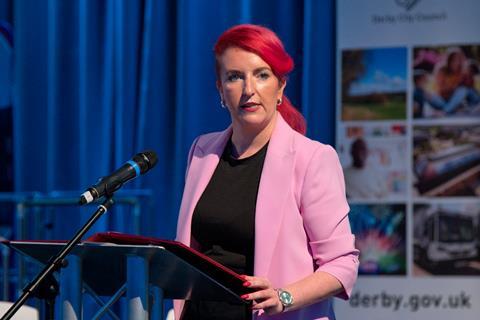
UK: Great British Railways will provide a ‘cultural reset’ where ‘every part of the workforce feels empowered to challenge the orthodoxy of years past, supported by an entirely new and reformed organisation’, according to Secretary of State for Transport Louise Haigh, who emphasised it ‘will not be British Rail Rebooted or Network Rail 2·0’.
Speaking to the press following the launch of Rail Campus Derby on October 17, Haigh confirmed that had the previous government not already announced GBR a similar process would have been followed by Labour.
‘There’s been widespread consensus for many years about the problems in the railways and that’s what our reforms are set up to address’, she said. ‘We would always have created a single directing mind and that is where our reforms go a little bit further than the previous government’s, in bringing private operations into public ownership, bringing track and train together. ‘
The Passenger Railway Services (Public Ownership) Bill ‘calls time on a broken model, one that repeatedly failed passengers and one that cost tens of millions of pounds in fees each year’.
She confirmed that the government would ‘bring passenger services into public hands as contracts expire over the next three years’, and said ‘in the meantime, I won’t hesitate to take decisive action if operators don’t meet their obligations. It’s a message I’ve already delivered loud and clear to the managing directors of Avanti West Coast and CrossCountry.’
Haigh said there has been a lack of political leadership on rail, which she described as ‘an industry more comfortable looking inwards, that fails to pull together when things go wrong, that has lost focus on improving each part of people’s experience with the railways — so passengers don’t get the journeys they deserve’.
Great British Railways would be a ‘directing mind running the railways as one system, with a relentless focus on passengers’ and would ‘stop the blame game, by unifying track and train’.
She said ‘it is really important to me that we have a new culture behind GBR’, but noted that this will ‘be the work of years, not months’. Rail Business UK understands that a cross-sectoral ‘culture action group’ has already been established to try to break down barriers between parts of the industry.
Haigh said the creation of the Shadow Great British Railways under Chair Laura Shoaf is a recognition that change must begin immediately, adding ‘I’ve asked her specifically to lay the foundations of culture change the industry needs’.
Haigh said ‘under her leadership, the heads of Network Rail, DOHL and DfT’s rail services group — the people in charge of track and train — will work closer than ever before to set the tone of reform and deliver immediate improvements.’
This will include bringing forward some integration ahead of legislation being passed ‘because we knew we couldn’t wait for legislation to start delivering improvements now’.
New performance measures will follow to ensure a more consistent and transparent approach.
Network Rail will be abolished
Haigh said ‘Network Rail will be abolished, and Great British Railways will become both the infrastructure provider and deliver the operations. They will deliver track and train together and that’s what’s really important to create the new culture that Laura Shoaf is leading through Shadow GBR at the moment and will establish as we legislate and set up GBR.
‘It’s really important that it isn’t Network Rail 2·0, that it is bottom-up, delivering for the passenger and that we encourage that innovation from the workforce as well as the wider supply chain.’
Asked whether there is financial support to make this happen, Haigh said ‘the money is absolutely there to deliver the railways, not least because the privatised, fragmented system that we’ve got has been wasting so much money for so many years. So we want to make sure that the savings that we can deliver are reinvested in railway services and in the operation.’



